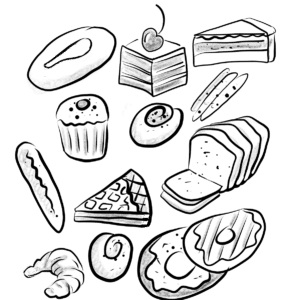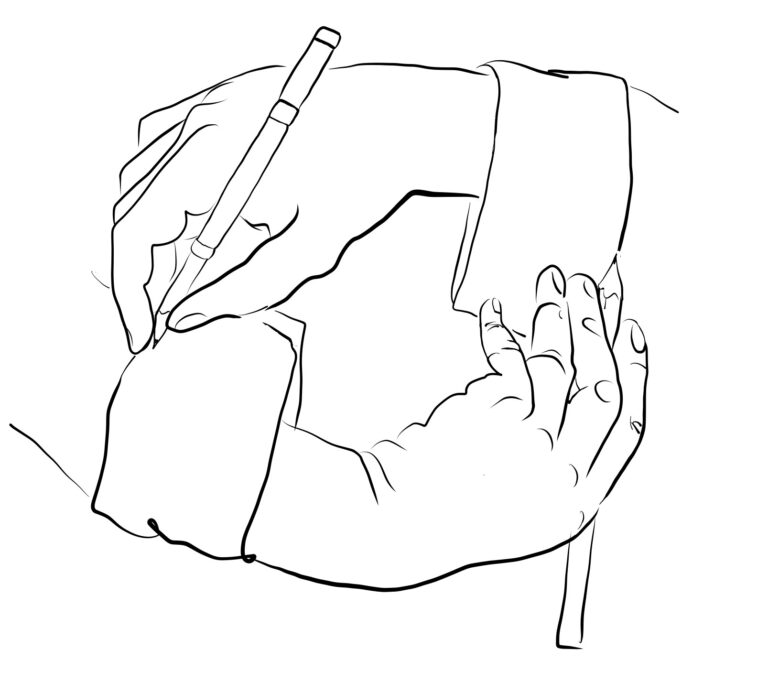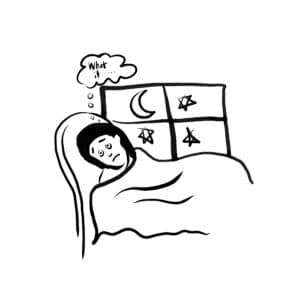
How Going Gluten-Free Transformed our Home
Hi, I’m Melissa, Beth asked me to explain how going gluten-free made a difference in our household. I have a

My son Harry has dyslexia. He also is mixed-handed (he doesn’t have a dominant hand), so is there a connection between dyslexia and hand dominance?
I learned someone could use a different hand depending on the task once he began to scribble. Before then, I assumed he was left-handed because he fed himself with his spoon in his left hand. However, he held the pencil in his right hand when he made marks.
Asking him to set the table can be frustrating. Although I taught him the little phrase, ‘The knife goes on the right,’ he’s never placed knives there. I don’t think this is due to the dyslexic’s left/right confusion. He just doesn’t want his knife on the right of his plate because he holds his knife in his left hand.
Recently, on a parents’ FB dyslexia forum, someone asked if dyslexia was linked to being left-handed or ambidextrous. This sparked a flood of responses, and it prompted me to investigate the topic of dyslexia and hand dominance.
Michael Corballis, PhD, a psychologist at the University of Auckland, says in an article for the American Psychological Association
The term mixed-handed (or cross-dominant) applies to Harry, who prefers using a particular hand depending on the task, i.e. eating with his left hand and writing with his right.
An article published in Neuroscience and Biobehavioral Reviews in 2023 identified an association between dyslexia and ‘mixed-handedness.’ In the study context, ‘mixed handedness’ referred to both ambidexterity (no hand preference for a task) and inconsistent hand use (using different hands across different activities.) The authors were surprised to find a robust link between dyslexia and mixed-handedness.
I read in a study published in the journal Pediatrics[i] that
The study also said:
Dr Rodriguez, who led this study, was at pains to point out that not all people who had mixed-handedness had ADD or learning difficulties, but this fits with my son, Harry, who has ADD and dyslexia.
Have you ever seen a 3D scan of a foetus? My friend showed me one the other day. It was amazing being able to see facial features so clearly. Her baby was sucking its right thumb. According to research[ii] from the 15th week, most foetuses suck the right thumb rather than the left. Some studies suggest low birth weight and mothers who are stressed during pregnancy can influence the chances of the child being left-handed.[iii]
In his book, ‘Scattered Minds,‘ Gabor Maté has much to say about maternal stress’s role in infant brain development.
Research into the genetics of hand dominance has shown that multiple genes are involved, and my book details some of the genes connected with dyslexia. However, environmental factors also play a part. Encouraging left-handed children to use their right hand may lead to mixed-handedness.
Research carried out after patients with epilepsy had their brains surgically split has shown that the two halves of the brain are responsible for different tasks. The left side controls language and the right emotional and nonverbal functions. When a person has a right-hand preference, the brain’s left hemisphere is dominant. Left-brain dominant people tend to be better at analytical thinking, while right-brain dominant are more ‘big picture’ thinkers.
In mixed-handedness, one side of the brain has no clear dominance over the other.
Harry has auditory processing issues; as a young child, he had a squint. In getting to the bottom of these conditions, I discovered most people are right-ear dominant and have a lead eye. Harry is left-ear dominant and doesn’t have a lead eye. A study in 1963 highlighted the role of having a dominant eye in reading success.[iv] In ‘Dyslexia. Wrestling with an Octopus’, I discuss the interventions we used to correct these issues.
According to one study, left-handed people are more intelligent[v].
A 2007 paper in The Journal of Mental and Nervous Disease (Vol. 195, No. 10) found that musicians, painters and writers were significantly more likely to be left-handed than control participants. The author, Corballis, has a theory as to why this is the case:
To read how to teach spelling and reading in 30 minutes a day, click here.
Speechify is an app that can help dyslexic children as it reads online text. Here is my affiliate link.
This post has been update. The reference for the article on dyslexia and mixed-handedness is
Julian Packheiser, Marietta Papadatou-Pastou, Angeliki Koufaki, Silvia Paracchini, Clara C. Stein, Judith Schmitz, Sebastian Ocklenburg,
Elevated levels of mixed-hand preference in dyslexia: Meta-analyses of 68 studies,
Neuroscience & Biobehavioral Reviews,
Volume 154,
2023,
105420,
ISSN 0149-7634,
https://doi.org/10.1016/j.neubiorev.2023.105420.
(https://www.sciencedirect.com/science/article/pii/S0149763423003895)
[i] ” Dr Alina Rodriguez, Mixed-Handedness Is Linked to Mental Health Problems in Children and Adolescents,” Pediatrics, Monday 25 January 2010.
[ii] Nadja Reissland, Ezra Aydin, Brian Francis, Kendra Exley. Laterality of foetal self-touch in relation to maternal stress. Laterality: Asymmetries of Body, Brain and Cognition, 2014; 1 DOI: 1080/1357650X.2014.920339
[iii] Nadja Reissland, Ezra Aydin, Brian Francis, Kendra Exley. Laterality of foetal self-touch in relation to maternal stress. Laterality: Asymmetries of Body, Brain and Cognition, 2014; 1 DOI: 1080/1357650X.2014.920339
[iv] Irving H. Balow (1963) Lateral Dominance Characteristics and Reading Achievement in the First Grade, The Journal of Psychology, 55:2,323-328, DOI: 10.1080/00223980.1963.9916624
[v] Susie Jeyalyn David, S. Rajasankar. Correlation between handedness and intelligence among schoolchildren. International Journal of Contemporary Medical Research2016;3(9):2683-26

Hi, I’m Beth. Seven years ago, when I discovered my son had dyslexia, I had a ‘light-bulb’ moment and understood this explained many of my own difficulties. Ever since, I’ve been on a mission to discover the best ways to wrestle what I like to call the dyslexia octopus.

Hi, I’m Melissa, Beth asked me to explain how going gluten-free made a difference in our household. I have a

I need nighttime anxiety relief. It’s 4 AM, and I’m reviewing what happened to Harry at school yesterday and wondering
12 Responses
I am over 65 years old and at the age of 41/2 received a wooden spoon on my left knuckles and forced to write with my right hand. I can use both hands for many things. In elementary school I had a hard time learning to read and spell, never managed to finish dictation. I was still struggling with the 1st sentence when the dictation was done. By memorizing words ( I have a high IQ), I managed to finish school and 4 years of college. I was told I was lazy, needed to work harder and nothing would ever become of me. On top of that, by the age of 6, due to travel for my father’s work, I had spoken 4 languages. It is recently I heard about a possible connection between dyslexia and being forced to become right handed. I appreciate your research and wish young children do not have to go thru my experiences with these new findings. Thank you, Dieuwke
Dieuwke, how sad you had to go through that punishment at school. I hope no child has to suffer such things in school these days. You are obviously a highly intellegent person and I am glad you managed to overcome the problem of an education system not designed to help you thrive. Beth
I learned when my girl’s were young, that cross dominance can lead to learning difficulties. One hand is used to write, and one eye is more dominant than the other eye. My kid was tested by the pediatrician. She used her right hand for writing, and she looked through a paper tube with her left eye. She had trouble learning to read, and couldn’t comprehend what she read until 3rd grade. Her sister learned to read in kindergarten. In 1rst grade , she read chapter books. She is right handed , right eyed. I am left handed, left eyed , and my husband is right handed .
It’s interesting to hear that cross dominance caused learning difficulties for your daughter. Thanks for commenting on this post.
I am 46 and have known of my dyslexia since I was 5 years old. In more recant years I have been doing some research and have found that doctors have proven through MRI’s that show how non-dyslexics left hemisphere of the brain is responsible for speech, language processing, reading, and spelling. The left side of the brain controls the right side of the body. In Dyslexics the left side of the brain is dormant or less active. Instead Dyslexics use the right side of the brain to help with speech, language processing, reading, and spelling to compensate with the less active left side. The right side of the brain is used for organizing information, abstart meaning, visual information, imagination, Music and art awareness. The right side of the brain controls the left side of the body. So I am mixed-handedness and am now wondering if it this has to do with my right sided dominance brain Dyslexia? What I mean is I write with my left hand and eat with my left hand but do all sports with my right hand. In some things like drinking I tend to use both hands….I am now wondering if my left hand used for things like writing is becasue of my language processing, reading, and spelling issues due to my dyslexic brain. Is my left hand writting related to my right brain dominance?
Hi Fraser, this is certainly an interesting area. I am not a neuroscientist, but my reading about the topic suggests that neurodivergent people don’t have the same strict divisions in their brain hemispheres as non-neurodivergent folks. I would say your left hand writing is related to your right brain domininace.
I have dysleixa and I am mixed handed. I write with my left and eat with my left but I play basketball with my right, and I favor my left ear and left leg. I never thought much about being mixed handed becuase it just became noramal to me, until people qusetioned it. I struggled with school mainly reading, writing, and vocablary. Since I struggled so much in school my paranets decieded to hold me back in the frist grade. Now I am doing pretty fine in school and don’t struggle as much. But I always wondered if my teachers knew I had dysleixa back then, if they would have understanded why I struggled and if they would have better help aviable to me.
Hi Ryana, yes, I’m sure it would have helped if the teachers back then knew about dyslexia. I’m pleased to hear you are doing well now.
It has only been the past decade that I have found the time to think about multie handedness! Or how it may relate to my dyslexia. Over the last few years have I put effort into using my left hand to hold a pen. Much to my surprise old leftie seems to spell much better then my right hand! The other thing that has come to the surface is the word ambisinistrous and how left handedness come with negative connotations! Dear google doesn’t even know the word!
This is so interesting. Who knew one hand could spell better than the other!
I find this train of thought about handedness very interesting. My father claimed to be ambidextrous although he generally had a favorite hand for different activities. He golfed left, played baseball left, but wrote with his right hand. He was required to change the pencil to his right hand throughout the first years of school. I also had scissors and pencils taken out of the left and placed in the right hand throughout first grade. I can not listen to a phone in my right ear, I hear the words but have difficulty comprehending. The phone must be at my left ear. I am right eye dominant, left ear and left leg dominant, if falling I catch myself with the left. My father was dyslexic and never learned to read well or enjoy it until middle age.I had no trouble with reading but write many letters and numbers backwards, and mix sequence although the correct numbers or letters are there, just out of order. I studied graphic art, then taught K-12 fine art for over 30 years.
Thank you for your comment Lois. It was facinating to hear how mixed handidness appeared in your family. I’m the same with the phone.